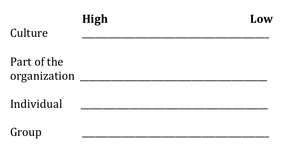
There are textbook answers. Would you be comfortable seeing your decision in the news for all of your friends and family to see? The old newspaper test. Today it might better be called the Periscope, Facebook, or Twitter test.
My thinking about business ethics is far from complete but here are a few of my thoughts. Many factors affect decision-making where there may be ethical issues. Here are four that stand out to me. I think each can be thought of as a continuum from high ethics to low ethics. As you read, think about you and your organization. Where would you or your organization rate on each factor?
- Culture: Increasingly we are recognizing the importance of organizational culture in selection and employee engagement. Is a strong sense of ethics embedded in your culture or is ethics just another word? Trusting, ethical cultures should have a competitive advantage. If your company has a Code of Ethics, is it meaningful in the lives of the employees?
- Part of the organization: Most of us work in a part of the organization, a subunit, branch, division, etc. It is possible for various parts of organizations to vary considerably in the ethical standards adhered or not adhered to. This may be a function of leadership. Perhaps eyes are turned away briefly resulting in increased profits. Are there parts of your organization where ethics often take a backseat? Are you in such a part of your organization?
- The individual: We are shaped by our beliefs, our values, our attitudes. Some of us have a strong moral core of right and wrong; others, less so. We each form psychological contracts with our organizations. Most things we are asked to do in the workplace we readily do. However, there are somethings that if asked, we would not do. And then there is the gray area where some of us will choose to do what is asked and others will not. In this gray area we often must make ethical decisions. How strong is your moral core? Would you sacrifice your integrity to keep your job?
- Group: Our workgroups or teams influence us through norms and other workplace behaviors. Sometimes the group arrives at a decision and expects others to conform. In some cases the group norms may result in unethical behavior, e.g., sleeping through the night on the graveyard shift when you are expected to be working. How ethical are the behaviors of the groups or teams of which you are a part?
_____________________
For more on our psychological contracts, group norms, and more, see Decoding the Workplace: 50 Keys to Understanding People in Organizations.
Aristoteles by Francesco Hayez. From https://commons.wikimedia.org/wiki/File:Francesco_Hayez_001.jpg. The work of art depicted in this image and the reproduction thereof are in the public domain worldwide. The reproduction is part of a collection of reproductions compiled by The Yorck Project. The compilation copyright is held by Zenodot Verlagsgesellschaft mbH and licensed under the GNU Free Documentation License.
__________________________
© John Ballard, PhD, 2015. All rights reserved.

 RSS Feed
RSS Feed